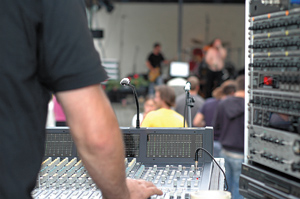Engineer Wanted

The phone call came in mid-morning; far enough into the workday that there had been ample time for a fight, some name-calling, and a long-overdue dismissal. The panicked employer at the other end of the line had a simple question: "Do you know any engineers looking for work?" My first (unspoken) thought was, "What exactly do you mean by 'engineer?'"
AN OLD WOUND
Years ago, when first invited to write in this space, I caused some trouble by suggesting that non-degree-holding technicians—the "audio engineer" and "video engineer"—might be more valuable to the production and broadcasting communities than the "double-E's" who hold legitimate title to the "engineer" designation. My, how times change.

An audio engineer who works for a British recording studio made IEEE's list of 10 engineering "dream jobs" this year. ©iStockphoto/Geoffrey Fritsch It's not that I thought engineers were entirely unnecessary. But my perception—not an uncommon one, I think—was that employing fully degreed and licensed professionals was overkill; in television, there were skilled tasks to be performed by experienced technicians, but hey, let's not go overboard, now.
That opinion, of course, was a reaction to an era long gone, one where the analog technologies of this new medium—television—were so daunting that the engineer became the ultimate arbiter of what could or couldn't be done… what content you'd be allowed to shoot, and under what conditions the delicate equipment would be asked to perform. In short, engineers were essential because you couldn't make a move without the engineers who enabled that technology.
But the stage was set; emerging technologies promised emancipation from engineering tyranny. By 2009, two factors which really should have killed off the need for real engineers—the omnipresence of automatic circuitry and the switch to non-tape-based storage—somehow, inexplicably, hadn't yet chased them away. Old-school "non-engineers" spent a lot of time setting up, adjusting and shading cameras; but the latest generation of automatics may arguably do a better job of tracking iris, blacks and gamma settings on the fly than a human technician ever could. Likewise, the absence of mechanical variability has largely reduced video storage to an appliance-based proposition; no more phase and tape tension adjustments—just plug-and-play.
Why, then, the renewed interest in bona fide engineers? While it's true that modern video and audio equipment is liberally coated with a layer of idiot-proofing, there's still plenty of underlying technology to interconnect and to master. And it's not just about moving a volt of video here, a volt of audio there, like it was in times past; today, it's all about IT infrastructure.
Veteran engineering personnel can easily recall the first piece of Ethernet-attached equipment to arrive at their facility—and the resultant confusion that ensued. Ten or 15 years later, they're proud that they've gradually learned about hubs and switches and routers, but that level of knowledge won't cut it today… they'll need to be able to dissect the very packets of TCP/IP data themselves; troubleshoot recalcitrant PSIP errors; and wrestle a 19 Mbps bitstream from an MPEG-2 encoder to the exciter.
And so, add one more to that engineering pantheon inhabited by the RF engineer and the double-E: all hail the network engineer. And no matter which discipline, you can't get by with a cross-trained production assistant; this is the real thing—hard-core technology fundamentals that seldom arrive without being wrapped in an engineering diploma.
THE ENGINEER AS ROCK STAR
I saw one telling sign of this shift in emphasis in the last issue of the IEEE's monthly magazine, Spectrum. Once a year, that prestigious electrical engineering society spotlights 10 EE's working in "dream jobs;" ranging from eco-engineering project leaders to toy designers, and located in a variety of edgy to exotic environments, these engineers are recognized as the coolest of the cool. Included in the 2009 profiles: An audio engineer.
Say what? Everyone knows that for eons, "audio engineer" has simply referred to the roadie behind the PA console. Fast-forward to 2009: This engineer works for a bleeding-edge British recording studio, co-owned by an avant-garde recording artist. Requirements? Theoretical plus working knowledge of acoustics, electronics and systems integration, suffused with a sense of showmanship and a love of music. "Artsy" is nice, but be sure you've got it backed up with science and technology.
We've watched for years as engineering school applications have slowed to a relative trickle, and wondered just what it would take to regenerate interest in the engineering professions. With financial careers distinctly less attractive these days, maybe it's time for an uptick on the science and technology front; because in the arts, entertainment, journalism and mass media, it's clear that you can't make a move without the engineers who enable your technologies.
Walter Schoenknecht is a partner at Midnight Media Group Inc., a New York-area digital production facility. You can reach him via e-mail atwalter@mmgi.tv.
Get the TV Tech Newsletter
The professional video industry's #1 source for news, trends and product and tech information. Sign up below.
